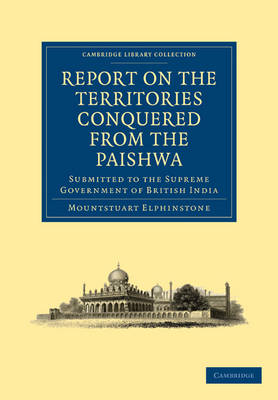Cambridge Library Collection - South Asian History
2 total works
Report on the Territories Conquered from the Paishwa
by Mountstuart Elphinstone
Published 30 June 2011
Mountstuart Elphinstone (1779-1859) was a colonial official who spent his career in India, eventually becoming governor of Bombay in 1819. Before that he was resident in Poona (Pune) during the final days of the Maratha empire. He was fluent in Persian and took an interest in the culture of the region. This report, however, published in 1821, is a political work. The report describes the western Indian territory that the British had acquired by 1818, and Elphinstone provides a geographical overview of the area and the people who lived there. He then gives a brief sketch of Maratha history before moving on to the crux of the work: how to administer the territory, with the question of how to raise more revenue being of especial importance. This report provides a first-hand example of the inner workings of the British Empire in India.
The historian George W. Forrest (1846-1926) pays tribute to the legacy of Mountstuart Elphinstone (1779-1859) by bringing his writings together in this 1884 publication, which begins with a account of Elphinstone's life and the historical events connected with his career, providing important background information and context for the reader. Forrest provides a fascinating insight into Elphinstone's opinions on some of the leading questions connected with the government of British India. The statesman played a pivotal role in founding the system of state education in India, strongly supporting native education and the local administration of laws. As Forrest describes, he brought 'a liberal and highly cultivated mind' to discussions of Indian problems, and he saw the British task in India as equipping Indians for self-government as quickly as possible. This collection documents his challenges and achievements, and is an important historical record of a turning point in Indian history.

